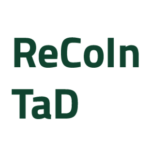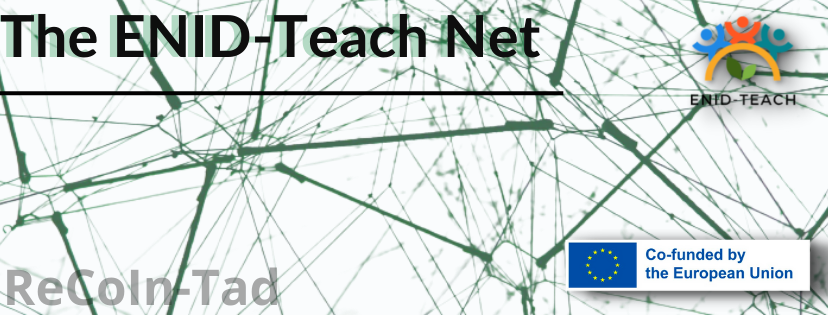The ENID-Teach Net: ReCoIn-TaD
Presentation and origin
“International cooperation network for knowledge transfer of and digital learning facing postCOVID crisis” (ReCoIn-TaD) was launched in June 2020, through the project “International cooperation network for knowledge transfer of and learning facing postCOVID crisis”. Project funded by the Vice President for Institutional Policy and International Relations of the National University of Distance Education (UNED) (Spain). As a result of this beginning, the network is configured as a space of international, European and Latin American confluence. Grows, enriched and fed back by the participation and contributions of researchers and teachers innovative interdisciplinary field. The crisis caused by the COVID-19, and isolation that has led, has caused the inter-university networks, strongly cohesive under normal circumstances, have gone to fret. For this reason, InCoN-TDL seeks to re-establish the university network that allows the strengthening of connections between European universities and, in turn, on the basis of a specialized training process against disinformation, serves as an antidote to the infodemic.Now more than ever it is important to address the connections between different university institutions through their teaching staff and the formation of networks with common objectives. The collaboration between the universities and associations that make it up, from an international perspective, seeks to respond to an increasingly uncertain digital society, from an innovative educational approach, where technology and digital pedagogical innovation converge in alternative methodologies that facilitate progress of the university education system.
In short, the network aim is to provide the university community with digital skills and sensitize the university community to the threat posed by the phenomenon of disinformation in general lines for a cohesive Europe, and more specifically in situations of uncertainty, such as the one experienced before the health emergency.

Network development and stability
InCon-TDL strengthens and reinforces its development within the framework of the project. “European network in D-flexible teaching (ENID-Teach), KA220-HED – Cooperation partnerships in higher education, 2021-1-ES01-KA220-HED-000027551”. The ENID-Teach project has been funded by the European Commission in the framework of the Erasmus+ programme. Grant n. 2021-1-ES01-KA220-HED-000027551.
Among the main objectives of the European ENID-Teach project is the development of the ReCoIn-TaD network: The aim is to reinforce a model of European inter-university cooperation by creating a cohesive and distributed university network where teachers are posited as intermediary connection nodes (anchors) within and between universities for the exchange of practices in flexible digital teaching methods.
How will it develop?
A university-based distributed international network will be developed with associated teaching staff participating in the training programme and committed to sharing experiences in flexible digital teaching practices. It will be the continuation of the ReCoIn-TaD network and will be established on the EPALE platform.
ENID-Teach project aims to give stability and consistency to the network.
The network will seek its stability through the development of agreements and / or activities with the members of the network once the project is completed. Two initiatives are being developed to achieve this objective:
On the one hand, the signing of a declaration of interests with the teaching staff interested in joining the network through the form: https://acortar.link/Wc6f2X
On the other hand, the signing of collaboration agreements between teaching staff and institutions. The signing of a multilateral collaboration agreement between the project partners, as well as other bilateral agreements with other institutions that share interests with ReCoIn-TaD.
What is the result to be reached?
It will be known how strongly the network is expanding by observing the contributions to the EPALE community, social network analyses and ReCoIn-TaD network registrations.
- More than 100 teachers from different countries will join the EPALE platform (blogs, forums and collaborative spaces: practice community and collaborative space).
- A minimum of 80% of the teachers participating in the training program join the ReCoIn-TaD network. Minimum of 50 per partner country.
A database of teachers with common interests (training in digital pedagogies) will be provided to the EPALE platform, which will be a community of practice and a space for collaboration and will be configured as a communication tool and a space for collaborative work in the construction of new quality pedagogical practices. This process will be complemented by the creation of digital networks and the extension of the existing ReCoIn-TaD network.
Communication and interaction
We have several means of communication and interaction.
On the one hand, the EPALE platform is considered a space not only for communication, but also for exchange of experiences and work between the members of the network and the project partners: ENID-Teach Net.
On the other hand, a communication process is carried out through the following digital networks.
Emails
| enid-teach@edu.uned.es | UNED (Coordinator) | Spanish and English |
| enidteach@bfu.bg | BULGARIA | English |
| enidteach@savoirdevenir.net | FRANCE | French |
| enidteach@uab.pt | PORTUGAL | Portuguese |
| enidteach@unict.it | ITALY | Italian |

How to join the ENID-Teach network?
If you are interested to join our network, please fill this application form.

Lines of work
On the basis of the established network, different initiatives are proposed:
I1. Train teachers in digital skills through massive open and accessible courses.
The first sMOOC was “Digital Competences in Uncertain Times” whose objective is to digitally train teachers and professionals from different areas of education and civil society. It is intended for educational institutions and social organizations with training needs in the five areas of competence established by the latest European resolution on teaching digital skills (information literacy, communication and collaboration, creation of digital content, security and problem solving). The first edition of the course is developed with the University of Quilmes (Argentina). (Date: 02/22/2021 to 04/04/2021)
In addition, in the context of the ENID-Teach project, five NOOCs for digital teacher training in digital pedagogies are offered:
NOOC 1. Connected and Critical Methodologies
NOOC 2. Collaborative and Research Methodologies
NOOC 3. Active and Gamified Methodologies
NOOC 4. Inverted Methodologies
NOOC 5. Designing Flexible Learning D-Programmes
I2. Request research projects that will disseminate to European and Latin American context resources and innovations made. It is intended to be done through the application and development of Erasmus + projects, K2 Action “Cooperation for innovation and the exchange of good practices”, in the actions “European universities” and “Capacity building in the field of Higher Education”. Therefore, transnational projects will be based on a multilateral partnership between higher education institutions. Participation in projects depends on the calls to be published and the acceptance of them.
Among the most important lines of research that ReCoIn-TaD currently has, the analysis of the challenges for the university of the future stands out, studying the challenges and perspectives of teacher training in the face of the PostCOVID crisis and what are the most effective means for transfer knowledge and international cooperation. These lines respond to an analysis of the current educational model that was already requiring, in the period prior to the pandemic, a transformation in which the inclusion of connected processes and communicative and educational approaches will be committed, based on pedagogies. digital activities, will give a greater role to students, as future agents of social change. After the unique experience lived by COVID-19, we have been able to observe how it is a priority to have more flexible, multidisciplinary and transversal communication and educational structures where d. response to the people who need it most, without any distinction.
I3. Establish agreements between universities when the circumstances and mutual needs require it.
I4. Launch cooperative innovation projects between universities with the aim of offering a cartography of digital pedagogies. This mapping is configured taking into account two moments of analysis. On the one hand, analyzing the students’ previous academic experiences in education and digital communication. And, on the other, based on the results of the study of the potentiality of innovative pedagogical initiatives based on communication processes, social networks, new narratives, performance, collaborative and active learning, augmented reality, among other methodologies implemented by the network members.
In this line, the UNED began to work in the academic year 2017-18 and is currently working through teaching innovation projects developed by the Communication, Social Networks and New Narrative Group (CoReN) (GID2017-4) Coord. Sonia Santoveña-Casal), to which some of the members of this network belong. The Group carried out a process of mutual enrichment with contributions from other members of INCON-TDL and thus advance the educational innovations internationally.
Participants & Members
European Union
Sonia Santoveña Casal, UNED (Spain). Coordinator
Lorena Serjanaj, University of Vlora “Ismail Qemali” (Albania)
François Jourde (Belgium)
Mariya Monova-Zheleva, Burgas Free University (Bulgaria)
Yanislav Zhelev, Burgas Free University (Bulgaria)
Polina Mihova, New Bulgarian University (Bulgaria)
Divina Meigs, Université Sorbonne Nouvelle (France)
Brigitte Orjuela, UNICAEN (France)
Renata Gambino, Università degli Studi di Catania (Italy)
Fernando-José Sadio-Ramos Instituto Politécnico de Coimbra (Portugal)
Hugo Pereira, Universidade Aberta (Portugal)
Filipe Penicheiro, Universidade Aberta (Portugal)
Lina Morgado, Universidade Aberta (Portugal)
Ana Afonso, Universidade Aberta (Portugal)
Mª Dolores Fernández Pérez. UNED (Spain)
Javier Gil Quintana, UNED (Spain)
José Javier Hueso, UNED (Spain)
Itziar Pedroche Santoveña, UNED (Spain)
Irene Méndez Sánchez, UNED (Spain)
Rubén Gómez Méndez, UNED (Spain)
Kilian Lavernia Biescas, UNED (Spain)
Sara Osuna Acedo, UNED (Spain)
Ángel Barbas Coslado, UNED (Spain)
Carmen Cantillo Valero, UNED (Spain)
Sonia E. Rodríguez García, UNED (Spain)
Ernesto Antonio Vázquez Castro, UNED (Spain)
Marimar Roman García, UNED (Spain)
David Jiménez Hernández, UNED (Spain)
Simón Gil Tévar, UNED (Spain)
Raúl González-Fernández, UNED (Spain)
María Jesús Roldán Roldán, UNED (Spain)
Ursula Moreno Benitez, UNED (Spain)
Cristina Sánchez Romero, UNED (Spain)
Eva María Muñoz Jiménez, UNED (Spain)
Eduardo Garcia Blazquez, UNED (Spain)
Rocío Silleras-Aguilar, UNIR and Universidad Europea de Valencia (Spain)
Jesús Ángel Sánchez Rivera, Universidad Complutense de Madrid (Spain)
Jeritza Patrocinia Campos Arias, Universidad Cristiana Evangélica Nuevo Milenio (Spain)
Eduardo López, Universidad de Castilla-La Mancha (Spain)
Inmaculada Aznar-Díaz, Universidad de Granada (Spain)
María Ruiz Ortiz, Universidad Internacional de Valencia (Spain)
Francisco Recio Muñoz, Universidad Internacional de Valencia (Spain)
Belén Puebla Martínez, Universidad Rey Juan Carlos (Spain)
María Pilar Cáceres Reche, University of Granada (Spain)
Adrián De La Fuente Ballesteros, University of Valladolid (Spain)
Bandrés-Goldáraz Elena, University of Zaragoza (Spain)
Césae Bernal-Bravo, University Rey Juna Carlos (Spain)
Joyce Pérez Ospina, UNAV (Spain, Colombia)
Valeria Levratto, Universidad Juan Carlos I (Spain)
Vicente Montiel Molina, ECO Digital Learning (Spain)
Latin America
Susana Regina López, Universidad de Quilmes (Argentina)
Silvina Berti, Universidad Nacional de Río Cuarto (Argentina)
Fabio Gabriel Salas, Universidad Nacional de San Luis (Argentina)
Silvia Baldivieso, Universidad Nacional de San Luis (Argentina)
Andrés Sabella, Universidad Nacional de Entrerios (Argentina)
Raul Alberto Rivera, OTIPA – UNPSJB, (Argentina)
Marisa Elena Conde, Universidad Nacional de José C. Paz (Argentina)
Caio Cesar Giannini Oliveira, Faculdade de Comunicação e Artes (PUC-Minas-Brasil)
Jardel Garcia, Centro Universitário UNA (Brazil)
Rosemary Francisco, UNISINOS (Brazil)
Manoel Barata, Fundação Oswaldo Cruz (Brazil)
Claudio Pinto, Governo do Estado da Bahia (Brazil)
Paula Carolei, Unifesp (Brazil)
Mauro Castillo Valdés, Universidad Tecnológica Metropolitana (Chile)
Miguel Sanhueza Olave, Universidad Tecnológica Metropolitana (Chile)
Marisol Durán Santís, Universidad Tecnológica Metropolitana (Chile)
Victor H. Escobar J., Universidad Tecnológica Metropolitana (Chile)
Mauro Castillo, UTEM (Chile)
Efrén Romero Riaño, Universidad Industrial de Santander (Colombia)
Yeldy Rodríguez, Vicerrectora Académica de la Universidad UNIMINUTO (Colombia)
Carmen Eugenia Pedraza Ramírez, Universidad Nacional Abierta y a Distancia (Colombia)
Andrés Felipe Mena Guacas, Universidad Cooperativa de Colombia (Colombia)
Jehuar Robinson Murillo Cruz, ESAP (Colombia)
Mónica Daniela Méndez Palomino, Universidad Distrital Francisco José De Caldas (Colombia)
Karla Valdez, Universidad de San Carlos de Guatemala (Guatemala)
Miguel Ángel Gallegos Cárdenas, Red Educativa Mundial (REDEM) (México)
José Manuel Álvarez Becerra,Universidad de Guadalajara (México)
Juan Antonio Centeno Quevedo, Universidad Autónoma de Tamaulipas (México)
Isabel Gallardo, Universidad Nacional Autónoma de México (México)
Norman René Trujillo Zapata Universidad Nacional de Ingeniería (Nicaragua)
César Martín Agurto Castillo, Universidad Nacional de Piura (Perú)
Initiatives and results
Publications
Santoveña-Casal, S. y Gil-Quintana, J. (Coords.). (2021). Redes de Cooperación Internacional para la transferencia del conocimiento, la investigación y el aprendizaje digital (En tiempos inciertos). Dykinson, S.L.
More info
Congresses
Conference for the Transfer of Knowledge and Digital Learning in the face of the Postcovid Crisis (2021)
More info
Collaborations
The ReCoIn-TaD network collaborates with the Asociación de Innovación Docente Iberoamericana (IDI) in
– JORNADAS DE DOCENCIA E INNOVACIÓN IBEROAMERICANAS (II IBERO-AMERICAN TEACHING AND INNOVATION MEETINGS) Website
– JORNADAS SOBRE TENDENCIAS EN INNOVACIÓN EDUCATIVA: LA UNIVERSIDAD COMO AGENTE DE CAMBIO SOCIAL, 2-3 November 2022, Website


